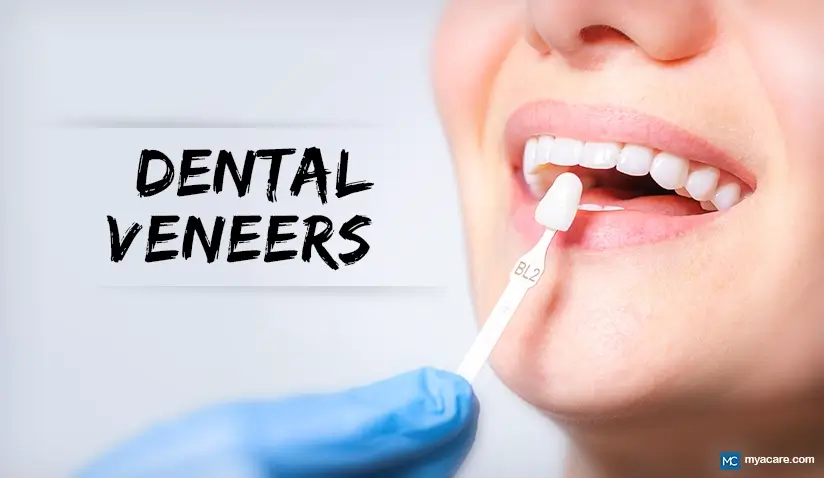Dental Veneers - Types, Benefits, and Costs

According to 2019 research, more than 62% of US residents aged between 25 and 44 years cover their mouth while smiling, because they are conscious of their smile. This could be due to the presence of crooked teeth, discolored teeth, or spacing between teeth.
Dental veneers are a good option to restore unattractive front teeth. These are customized, thin shells of tooth-colored materials placed on the front (visible) part of teeth to mask the discoloration or uneven shape of the teeth. The bonding of customized veneers helps restore the size, shape, and height of the front teeth.
In this article, we discuss the types, benefits, and costs involved in dental veneer procedures.
When to undergo dental veneer procedures?
Dental veneers are recommended in cases of:
- Discoloration of teeth due to
- Fluorosis (excess fluoride intake)
- Tetracycline staining (Side effects of tetracycline)
- Enamel hypoplasia (defect in the enamel during tooth formation)
- Injury or damage to the tooth (due to trauma or decay)
- Aging (Outer enamel layer of the tooth wears off with age and exposes the inner yellowish layer of dentin)
- Abnormal shape of the teeth (e.g. Peg laterals: conical-shaped second tooth from the front)
- Uneven spacing between front teeth
- Chipped, fractured, or worn off teeth
- Minor mispositioning of teeth (e.g. rotated teeth or teeth inclined inwards)
When should you avoid undergoing treatment with dental veneers?
Here are the conditions when dental veneers are not recommended:
- Insufficient tooth structure to place the veneers
- Poor oral hygiene
- The involuntary habit of clenching and grinding teeth (Bruxism) or nail-biting
- Severely misaligned teeth
- Excessive spacing or crowding between teeth
What are the different types of dental veneers?
There are mainly two types of dental veneers — Porcelain and Resin veneers
a. Porcelain or ceramic veneers: Porcelain veneers are strong and durable. They are fabricated through an indirect technique. These veneers are highly durable and offer good strength. If maintained well, they last long for 10-20 years compared to 5 years with resin veneers. Smooth surfaces of porcelain veneers resist their staining. However, placement of porcelain veneers may require 2-3 appointments and are difficult to repair. Also, more amount of tooth structure is lost during tooth preparation to accommodate porcelain veneers compared to the resin veneers.
Porcelain veneer’s fabrication (Indirect technique):
- After the initial clinical and radiographical assessment of the teeth, the dentist reduces a small amount of enamel (=<1mm) from the front and side surfaces of the teeth.
- Later, the dentist takes an impression of the prepared teeth, selects the shade, and sends it to the laboratory.
- Based on the impressions sent to the laboratory, ceramic veneers are fabricated. Meanwhile, temporary veneers are fixed until the individual receives the final ones.
- In the next visit, a trial is performed to check the fit, shape, and color match of veneers when placed on teeth. Any corrections required are communicated to the laboratory.
- In the final visit, teeth are cleaned and treated with chemicals for better adhesion. Later, veneers are bonded to the teeth using cement.
b. Resin veneers: Resin veneers are one-visit procedures. These are mainly used to mask mild to moderate discoloration. Even minor dental defects in the shape or position of front teeth can be corrected using resin veneers. These are fabricated through direct technique. These resin veneers offer high aesthetics and require less chairside time. Minimal tooth preparation preserves more tooth structure and are cost-effective. However, these veneers discolor or wear off quickly and require frequent repairs.
Resin veneer’s fabrication (Direct technique):
- A dentist prepares or reshapes the tooth to be corrected. Once the tooth is prepared, composite material (tooth-colored cement) of the shade that matches adjacent teeth color is chosen.
- The composite material is added and bonded to the tooth surface and hardened using special light-based equipment. Later, the tooth with composite veneer is smoothened.
How much do dental veneers cost?
On average, a single tooth porcelain veneer in the US costs around 500-2500 USD. A set of 6 composite veneers costs between 3000-15000 USD. Meanwhile, a single tooth composite veneer costs around ~250-1200 USD. The cost of a set of 6 composite veneers ranges from 1500-7200 USD.
What are the benefits of undergoing dental veneer restorations?
Here are some of the benefits of undergoing the procedure:
- Restoring teeth with veneers requires minimal enamel removal from the front and side surfaces of teeth (=<1mm) compared to the crown placement procedure
- Veneers have better color stability, offering a natural appearance to the restorations
- They help conceal the discoloration, cracks and fix the minor cosmetic defects due to malposed teeth
- They lighten the front surfaces of teeth that are naturally yellow or greyish in appearance and cannot be bleached
- They are easy to maintain
What are the shortcomings in restoring teeth with dental veneers?
Here are some of the shortcomings with dental veneers:
- The cost involved in dental veneer placement is high compared to crowns
- It is a technique-sensitive procedure which requires high-level precision in clinical and laboratory work
- Veneers are difficult to manipulate once fixed on the tooth surface
- The procedure is time-consuming and requires multiple visits
How to maintain dental veneers?
Dental veneers are easy to maintain. However, they are prone to the risk of dislodgement if not maintained well. Here are some of the tips to maintain dental veneers:
- Brush and floss twice daily to maintain good oral hygiene
- Avoid regular intake of foods and beverages that can easily stain teeth (e.g. tea, coffee, wine, berries, colored drinks, and ketchup)
- Avoid intake of sticky chocolates, candies, or direct biting on hard foods such as raw fruit, vegetables, and meat
- Avoid the habit of biting nails or chewing ice with veneers as it may chip them off
- Visit a dentist every six months for a check-up
To search for the best dentists in Germany, India, Malaysia, Poland, Singapore, Spain, Thailand, Turkey, the UAE, the UK and the USA, please use the Mya Care search engine.
To search for the best healthcare providers worldwide, please use the Mya Care search engine.

Dr. Shilpy Bhandari is an experienced dental surgeon, with specialization in periodontics and implantology. She received her graduate and postgraduate education from Rajiv Gandhi University of Health Sciences in India. Besides her private practice, she enjoys writing on medical topics. She is also interested in evidence-based academic writing and has published several articles in international journals.
References:
Featured Blogs



